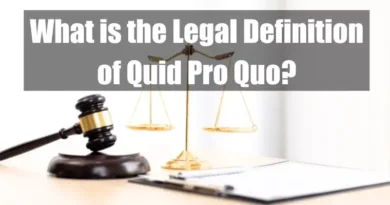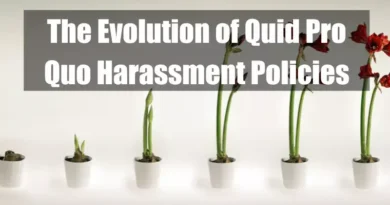Quid Pro Quo Legal Definition for Impeachment
The quid pro quo impeachment definition refers to a situation where a public official uses their position to exchange official actions or favors for personal or political gain. This involves a corrupt transaction where the official breaches public trust by offering or receiving something of value in return for specific actions or benefits, constituting grounds for impeachment.
Takeaways
| Key Points |
|---|
| Impeachment serves as a crucial mechanism in democratic systems to hold public officials accountable for misconduct, with “quid pro quo” often being a focal point in such proceedings. |
| Derived from Latin, meaning “something for something,” quid pro quo in legal terms refers to a reciprocal exchange of value, which becomes problematic when public officials misuse their position for personal gain, violating trust and integrity. |
| Historically, impeachment traces back to British parliamentary practices, adapted by the U.S. Constitution to address “high Crimes and Misdemeanors,” though these terms remain open to interpretation based on precedents. |
| Notable cases, such as Nixon’s Watergate scandal and Trump’s Ukraine aid allegations, underscore the role of quid pro quo in impeachment, highlighting the necessity of proving corrupt intent, breach of trust, and significant exchange of value. |
| These cases emphasize the importance of checks and balances in preserving public trust, reinforcing ethical governance, and upholding accountability in democratic institutions. |
Introduction
Impeachment is a critical mechanism within democratic systems for holding high-ranking officials accountable for misconduct. One pivotal aspect often examined in such proceedings is “quid pro quo.”
This term, derived from Latin meaning “something for something,” encapsulates the idea of an exchange. In the legal context, particularly concerning impeachment, it signifies an official offering or receiving a favor in return for something of value.
This article explores the legal definition of quid pro quo in impeachment proceedings, its implications, and historical instances that highlight its significance.

Understanding Quid Pro Quo in Legal Terms
In law, quid pro quo denotes a reciprocal transaction where each party provides something of value to the other. This concept is commonplace in many legitimate transactions. However, the dynamics shift when it pertains to public officials. Misusing public office for personal gain through such exchanges can lead to accusations of corruption, bribery, and abuse of power.
Historical Context of Impeachment and Quid Pro Quo
The concept of impeachment has roots in British parliamentary practice, which has been adopted and adapted by the United States and other democracies. The framers of the American Constitution incorporated impeachment to remove officials who engage in “high Crimes and Misdemeanors.” Although the Constitution does not explicitly define these terms, historical precedents and judicial interpretations have provided significant clarity.
Legal Framework and Standards
The U.S. Constitution assigns the House of Representatives the power to impeach, while the Senate holds the power to try all impeachments. For a quid pro quo to qualify as an impeachable offense, certain criteria must be met:
- Breach of Public Trust: The official must exploit their position for personal benefit.
- Corrupt Intent: There must be a deliberate intention to exchange official actions for personal gain.
- Material Exchange: The quid pro quo must involve a significant value influencing official actions.
Case Studies and Precedents

Examining historical impeachment cases provides insights into how quid pro quo has been interpreted and adjudicated.
1. Andrew Johnson (1868): Johnson faced impeachment primarily due to his violation of the Tenure of Office Act. While not a classic quid pro quo case, his trial set important precedents for interpreting impeachable offenses.
2. Richard Nixon (1974): The Watergate scandal involved allegations of obstruction of justice and abuse of power. Nixon’s attempts to hinder investigations into the break-in at the Democratic National Committee headquarters included quid pro quo elements, such as offers of pardons and other favors to silence participants. He resigned before he could be impeached.
3. Bill Clinton (1998): Clinton’s impeachment stemmed from charges of perjury and obstruction of justice related to his extramarital affair with Monica Lewinsky. While not a traditional quid pro quo, his actions were deemed abuses of power, undermining public trust.
4. Donald Trump (2019 and 2021): Trump’s first impeachment revolved around allegations of withholding military aid to Ukraine in exchange for investigating a political rival. This case epitomized a quid pro quo, where official actions were allegedly tied to personal political gains. His second impeachment followed the Capitol riot, focusing on incitement of insurrection, which did not involve a quid pro quo but highlighted the breadth of impeachable conduct.
Legal Interpretations and Debates
The legal community frequently debates what constitutes a quid pro quo in the context of impeachment. Some argue that any exchange involving the misuse of public office warrants impeachment.
Others, in contrast, believe explicit and substantial evidence of corrupt intent and material exchange must exist. These debates underscore the importance of thorough investigations and comprehensive legal frameworks to ensure just outcomes.
Implications for Governance and Public Trust
Impeachment cases involving quid pro quo have far-reaching implications for governance and public trust. They highlight the delicate balance between power and accountability. Public officials must navigate their duties with integrity, avoiding actions construed as corrupt exchanges.
These cases also reinforce the role of checks and balances in democratic systems, ensuring that no official is above the law.

Conclusion
Quid pro quo, when linked to impeachment, encapsulates corruption and abuse of power. It underscores the need for vigilance, accountability, and adherence to ethical standards in public office.
Historical precedents and legal interpretations provide valuable insights, guiding contemporary and future impeachment proceedings. Understanding this concept is pivotal for maintaining the integrity of democratic institutions and fostering public trust.
FAQ
What differentiates a legal quid pro quo from an impeachable offense?
A legal quid pro quo involves an exchange where both parties provide something of value without violating any laws. In the context of impeachment, an offense occurs when a public official uses their position to engage in a corrupt exchange, thereby breaching public trust and exploiting their power for personal gain.
How does the burden of proof work in impeachment trials involving quid pro quo?
In impeachment trials, the burden of proof lies with the House of Representatives to present evidence of wrongdoing. The Senate then acts as the jury, determining whether the evidence presented meets the threshold for conviction. This often requires substantial evidence of corrupt intent and material exchange.
Can a quid pro quo be grounds for impeachment if it involves non-material benefits?
Yes, a quid pro quo can be grounds for impeachment, even if it involves non-material benefits. If the exchange involves misuse of public office for personal or political gain, it can still constitute an abuse of power and breach of public trust, warranting impeachment.
Are there international examples of quid pro quo leading to impeachment?
Yes, there are international examples where quid pro quo has led to impeachment or equivalent proceedings. For instance, former President Park Geun-hye was impeached in South Korea and later removed from office due to a corruption scandal involving quid pro quo exchanges with business conglomerates. This demonstrates the concept’s global relevance in maintaining governmental integrity.
What is “Impeachment” in the context of government officials?
Impeachment is a formal process by which a legislative body levels charges against a high-ranking public official, such as the President, alleging misconduct. It serves as a mechanism to address serious offenses like treason, bribery, or other high crimes and misdemeanors. The process typically begins in the lower house (e.g., the House of Representatives in the U.S.), which has the sole power to impeach, meaning to bring charges. If the official is impeached, the case moves to the upper house (e.g., the Senate), which conducts a trial to determine whether to convict and subsequently remove the official from office.
What does “Quid Pro Quo” mean in legal terms, especially regarding impeachment?
“Quid pro quo” is a Latin term meaning “something for something.” In legal contexts, it refers to an exchange where one party provides something of value in return for something else. In impeachment proceedings, a quid pro quo may involve a public official offering or soliciting favors, actions, or benefits in exchange for personal or political gain, which can be construed as an abuse of power or misconduct.
What are “Articles of Impeachment”?
Articles of Impeachment are formal written charges drafted and approved by the legislative body detailing the specific allegations against the official subject to impeachment. They function similarly to an indictment in criminal law, outlining the misconduct or offenses that justify removal from office. Each article specifies a distinct charge, and the legislative body votes on each to determine whether the official should be impeached on that particular count.
What constitutes “High Crimes and Misdemeanors” in impeachment proceedings?
The term “high crimes and misdemeanors” is derived from English common law and refers to serious power abuses or public trust breaches by officials. While not explicitly defined in the U.S. Constitution, it encompasses actions considered offenses against the state, including corruption, abuse of authority, and other significant misconduct that undermines the integrity of the office.
What is the role of the “House Judiciary Committee” in impeachment?
The House Judiciary Committee is a standing committee of the U.S. House of Representatives responsible for overseeing matters related to the administration of justice. In the context of impeachment, this committee conducts investigations into allegations against the official, holds hearings, and, if warranted, drafts and approves articles of impeachment to be presented to the full House for a vote.
What does “Conviction” entail in the impeachment process?
Conviction in impeachment proceedings refers to the decision by the legislative body conducting the trial (e.g., the Senate in the U.S.) that the impeached official is guilty of the charges specified in the articles of impeachment. Conviction typically requires a supermajority vote (two-thirds in the U.S. Senate). Upon conviction, the official is removed from office and may also be barred from holding future public office.
What is the significance of “Bribery” in the context of impeachment?
Bribery involves offering, giving, receiving, or soliciting something of value to influence the actions of an official in their public duties. It is explicitly mentioned in the U.S. Constitution as grounds for impeachment, representing a severe breach of public trust and abuse of power. Engaging in bribery undermines the integrity of public office and is considered a serious offense warranting impeachment.
What does “Censure” mean, and how does it differ from impeachment?
Censure is a formal statement of disapproval issued by a legislative body against one of its members or another public official. Unlike impeachment, censure does not remove the official from office but serves as a public reprimand for misconduct or unethical behavior. It is a less severe form of discipline that does not carry legal consequences beyond condemnation.
What is the “Impeachment Inquiry” phase?
An impeachment inquiry is the initial phase in the impeachment process, where the legislative body investigates allegations against a public official to determine if there is sufficient evidence to proceed with drafting articles of impeachment. This phase involves gathering documents, interviewing witnesses, and holding hearings to assess the validity and seriousness of the charges.
What does “Obstruction of Justice” signify in impeachment terms?
Obstruction of justice refers to actions that impede the investigation or administration of justice, such as tampering with witnesses, destroying evidence, or interfering with legal proceedings. In the context of impeachment, an official accused of obstruction of justice may have attempted to hinder investigations into their own misconduct, thereby exacerbating the original offense and justifying impeachment.
What is the role of the “Chief Justice” during a presidential impeachment trial?
In the United States, during a presidential impeachment trial, the Chief Justice of the Supreme Court presides over the proceedings in the Senate. This role ensures impartiality and adherence to legal standards during the trial. The Chief Justice oversees the presentation of evidence, rules on procedural matters, and maintains order but does not have a vote in the final decision.
What does “Perjury” entail in the context of impeachment?
Perjury involves knowingly making false statements under oath during legal proceedings. In impeachment contexts, if a public official commits perjury, it constitutes a serious offense as it undermines the integrity of the judicial system and violates the oath of office, potentially serving as grounds for impeachment.
What is “Malfeasance” in the context of impeachment?
Malfeasance refers to the intentional conduct by a public official that is wrongful or unlawful in performing their duties, causing harm to public interests. In impeachment contexts, it covers actions where an official deliberately misuses their power, violating the public trust by engaging in unethical or illegal practices, even if these actions may not rise to the level of criminal behavior. This term is critical in impeachment debates as it underscores how egregious misuse of power—through corrupt or negligent actions—can justify the formal process of removing an official from office.









